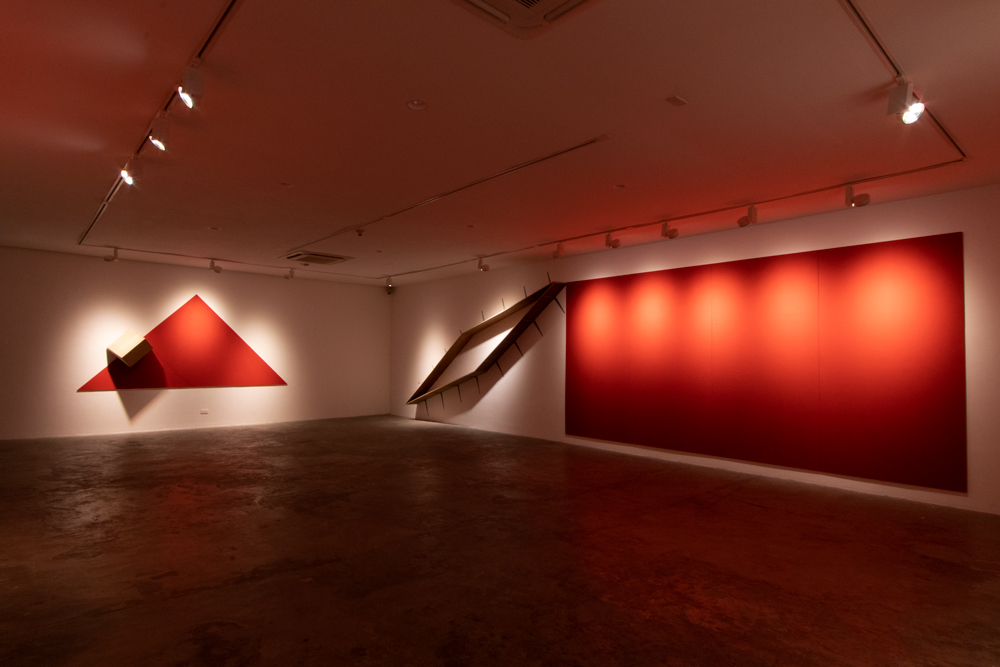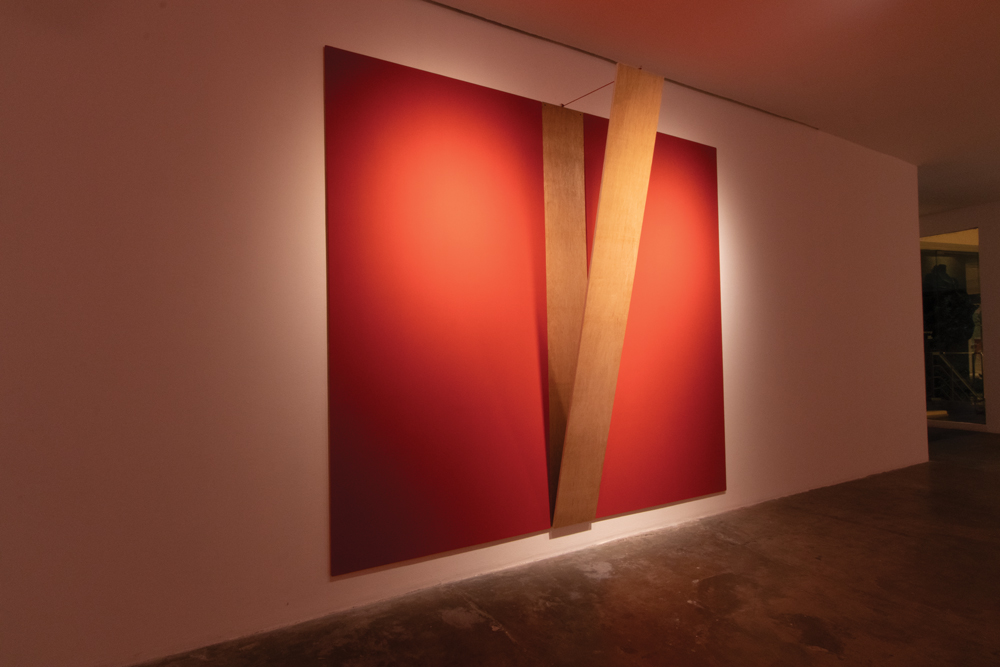Four Red Works / Arrival & Departure: The Melancholy Of
Roberto Chabet
20 March – 02 May 2021
Curated by
20 March – 02 May 2021

In 1989, Roberto Chabet’s “Cargo and Decoy” marked the end of his first trilogy of works using plywood as the main material and metaphor for the vagrancies of postmodern art and life. Composed of four separate works, the exhibition recalled the cargo cults in the South Pacific as an analogy for the illusions of space in painting. Responding to the challenge of the early modernist painters, Chabet sought to cut through illusion by assembling actual objects in real space, presenting themselves not as substitutes for reality, but as reality themselves.
Two works from the “Cargo and Decoy” series, “Four Red Works” and “Arrival and Departure: The Melancholy Of” have been re-made by King Kong Art Projects Unlimited as a homage to Chabet, who would have been 84 years old this month of March. More than thirty years since they were first exhibited at The Pinaglabanan Galleries, the reconstruction of the works provides an opportunity to witness and review Chabet’s deconstruction of painting and the rigidness of formalism. Using ordinary plywood panels and other hardware store-bought materials in often modular and geometric compositions, he created temporal environments where abstraction, idiosyncrasy, and the everyday collide.
Occupying the Main Gallery, Four Red Works characterize Chabet’s use of flat planes of primary color applied on plywood panels, which have been sealed and smoothened to remove any trace of wood grain underneath. Like Matisse who used red to dismantle spatial illusion in his paintings of interiors, Chabet’s red works reconfigure figure-ground relationships and the perspective of the room itself. Raw, unpainted plywood panels, in strips or shaped into a house and a boat, are attached either by string or metal brackets, serving as incisions in space to break the illusion of flatness of the red panels.
In the smaller adjacent room, Arrival and Departure: The Melancholy Of is a lyrical counterpoint to the analytic configurations of the red works. Painted in pure white oil, the plywood panel and the wooden dugout boat propped against it bear the glistening lightness of transience. The boat especially has been a constant symbol in Chabet’s own reckoning with the comings and goings of life. In this work, it marks a pause in between states of being, an acceptance of the unpredictable nature of things, or as Chabet himself described, “in the wink of an eye, the real may revert back to being a decoy and often, the art object as decoy, as illusion, seems more interesting.”
In his review of Chabet’s Cargo and Decoy exhibition in 1989, critic Armando Manalo wrote, “There is a sense in which all art is illusion; it seeks merely to approximate reality. But art exists, as it were, in a special niche. In art, the illusion is often also its reality. Mr. Chabet touches on a metaphysical question: the distinction between illusion and reality and where perhaps the distinction itself is an illusion. It is an unresolved question; artists can only propose solutions.”
Chabet’s work reminds us of perennial questions that need to be constantly renewed in order for art to find its meaning and relevance. In today’s rapidly imploding art scene, they become even more important as they steadfastly assert for critical introspection and vigilance, not only of art but also its practice and implications. Like the South Pacific islanders who created decoys of cargo planes and boats to attract celestial interventions, Chabet’s works continue to hold on to a timeless universal aspiration: art as a form of enlightened awareness that transcends time and space, a more expansive and more encompassing consciousness.
About the Artist
About the Artists

The pioneering Filipino conceptual artist, curator, and teacher Roberto Chabet is known for his groundbreaking experimental work which ranges from paintings, drawings, collages, sculptures, and installations that harness the found and the ordinary.
As the founding Museum Director of the Cultural Center of the Philippines, Chabet (1937-2013) initiated the Thirteen Artists Award in 1970 which aimed to support young artists whose body of work expressed “recentness and a turning away from the past.”
Posthumously awarded the Gawad CCP Para sa Sining in 2015, he had taught at the College of Fine Arts at the University of the Philippines Diliman for over thirty years.
Related Exhibitions
About the Artists
About the Artist
The pioneering Filipino conceptual artist, curator, and teacher Roberto Chabet is known for his groundbreaking experimental work which ranges from paintings, drawings, collages, sculptures, and installations that harness the found and the ordinary.
As the founding Museum Director of the Cultural Center of the Philippines, Chabet (1937-2013) initiated the Thirteen Artists Award in 1970 which aimed to support young artists whose body of work expressed “recentness and a turning away from the past.”
Posthumously awarded the Gawad CCP Para sa Sining in 2015, he had taught at the College of Fine Arts at the University of the Philippines Diliman for over thirty years.

Related Exhibitions

Share


















